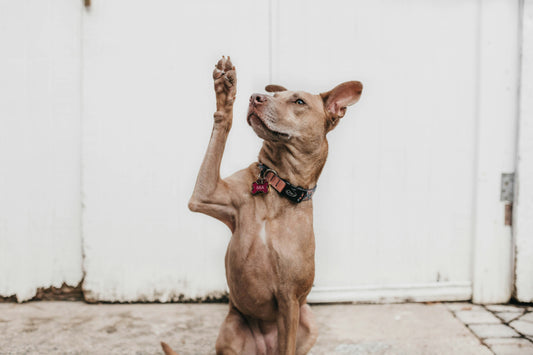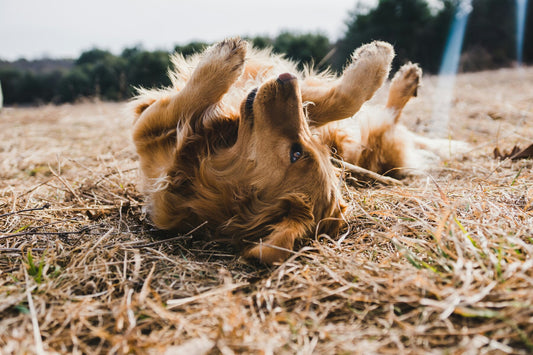Home Remedies for Skin and Coat Issues in Dogs

Itchy skin in dogs can be a symptom of larger health issues, ranging from allergies to bacterial or fungal infections, leaving our furry companions uncomfortable and distressed. It not only affects a dog’s well-being but can also lead to more serious conditions if left unchecked, making early detection and treatment crucial.
In this article, we’ll give you the secrets to a shiny coat and healthy skin for your dog, using simple home remedies and diet adjustments. Keep reading to discover how you can turn your dog’s skin and coat issues around with some expert guidance.
The Basics of Canine Skin and Coat Health
A dog’s skin and coat are the mirrors of their overall well-being. Healthy skin should be smooth and free of crusty scabs, while a healthy coat is shiny, not dull or brittle. These are not just aesthetic attributes; they are vital indicators of your pet’s health. The skin is the largest organ and serves as the first line of defense against environmental aggressors, while the coat protects against UV rays and helps regulate body temperature.
Vitamins such as A, E, and B-complex, along with nutrients like omega-3 fatty acids, play a crucial role in maintaining the integrity and health of your dog’s skin and coat. A deficiency in these can lead to dry skin, making your pet’s coat appear dull and increasing their risk of skin irritation.
Recognizing Common Skin and Coat Problems
As a devoted pet owner, it’s essential to stay vigilant for signs that indicate your dog is experiencing discomfort due to skin and coat issues. Common symptoms include persistent scratching, which points to itchy skin, or finding flakes of dandruff in their fur. You might also notice bald spots, excessive shedding, or skin that appears red and inflamed, which are clear signs of skin irritation.
Certain breeds with dense or long coats may be more prone to these problems, while others may have genetic predispositions to skin conditions. For instance, some breeds are known to suffer from food allergies that manifest as skin issues. It’s crucial to recognize these signs early to provide your dog with relief and prevent a minor irritation from becoming a full-blown skin infection.
Causes of Skin and Coat Problems in Dogs
Identifying the root cause of your dog’s skin and coat issues is a critical step toward finding the right solution. Environmental factors, such as extreme weather conditions, can lead to dry skin or exacerbate a dog’s itchy skin. Allergens like pollen, mold, or dust mites can trigger allergic reactions, resulting in skin irritation and discomfort. Parasites, such as fleas, ticks, and mites, are also common culprits that cause intense itching and can lead to secondary skin infections.
Nutrition plays a pivotal role in the health of your dog’s skin and coat. A diet lacking in essential nutrients can lead to deficiencies that manifest externally. For instance, a lack of omega-3 fatty acids often leads to a dull coat and flaky skin. Conversely, an excess of certain ingredients can lead to food allergies, presenting as itchy skin or gastrointestinal issues.
Stress and hormonal imbalances can also impact your dog’s skin health. Dogs under stress may lick or chew their skin excessively, leading to irritation or even hair loss. Hormonal imbalances, such as hypothyroidism, can result in a coarse, brittle coat or thinning fur. Genetic factors may also predispose some dogs to skin conditions, making them more sensitive to external and internal triggers.
Natural Remedies for a Shiny Coat and Healthy Skin
If you’re noticing your dog’s coat isn’t as lustrous as it could be, or if their skin seems irritated, there are several home remedies you can try. Natural oils, such as fish oil or coconut oil, can be added to your dog’s diet or applied topically to improve skin hydration and reduce dryness. These oils are rich in fatty acids that support skin health, leading to a shinier coat and less itchy skin.
For topical application, you can create a soothing mixture using apple cider vinegar diluted with water in a spray bottle. This can help alleviate skin irritation when sprayed onto affected areas, but be sure to avoid any open wounds or sores. Hydration is another key element; ensuring your dog has constant access to fresh water can improve skin elasticity and prevent dryness.
DIY grooming tips also play a significant role in maintaining skin and coat health. Regular brushing removes dead hair and skin, distributes natural oils throughout the coat, and can be a relaxing bonding activity for you and your pet. Bathing your dog with a gentle, dog-specific shampoo can help remove dirt and allergens that may lead to irritated skin.
Diet Adjustments for Better Skin and Coat
The adage “you are what you eat” holds true for our canine companions as much as it does for us. A well-balanced diet is fundamental for maintaining a healthy skin and coat in dogs. If you’re dealing with a dog’s itchy skin or a dull coat, it might be time to examine their diet closely.
Incorporating foods rich in omega-3 fatty acids, such as flaxseeds or oily fish, can significantly boost skin health. These nutrients support the skin’s natural oils, leading to a more vibrant and resilient coat.
Food allergies are another common concern that can lead to skin irritation. If you suspect your dog has food allergies, consult with a veterinarian to discuss an elimination diet. This process involves removing common allergens from your dog’s diet and reintroducing them one at a time to identify the culprit.
Additionally, the market offers specially formulated dog foods and treats designed to support skin and coat health. These products often contain a blend of vitamins, minerals, and fatty acids tailored to address skin and coat issues.
The Role of Supplements in Skin and Coat Health
When diet alone isn’t enough to resolve your dog’s skin and coat issues, supplements can play a crucial role in providing the additional nutrients needed. Before adding any supplements to your dog’s diet, it’s important to consult with a veterinarian to ensure they’re necessary and appropriate for your pet’s specific condition.
Supplements like biotin, zinc, and vitamin E can be particularly beneficial for dogs suffering from dry skin or a dull coat. Omega-3 fatty acid supplements, derived from fish oil or krill oil, are widely recommended for their anti-inflammatory properties, which can help alleviate symptoms of skin irritation and promote a healthier, shinier coat.
For dogs with specific issues such as crusty scabs or chronic itchy skin, there are targeted supplements available. These products often contain a blend of vitamins, minerals, and other nutrients like probiotics to support skin healing and reduce discomfort.
DIY Grooming Techniques and Their Benefits
Regular grooming is not just about keeping your dog looking good—it’s a fundamental part of maintaining their skin and coat health. DIY grooming can be a cost-effective and bonding experience for you and your pet. Here’s a step-by-step guide to effective home grooming:
- Brushing: Start with the right brush for your dog’s coat type. Brushing not only removes dead hair and dandruff but also helps to distribute natural skin oils throughout the coat, which can prevent dry skin and give the coat a healthy shine.
- Bathing: Use a dog-specific shampoo and lukewarm water. Bathing helps to remove excess oils, skin flakes, and allergens that can cause skin irritation. Be sure not to bathe too frequently, as this can strip away natural oils and exacerbate skin problems.
- Drying: After a bath, gently towel dry your dog or use a low-heat hairdryer. Ensure they are completely dry to prevent any dampness that can lead to skin infections.
- Ear and Eye Care: Clean your dog’s ears to prevent infections, and wipe around their eyes to remove any debris or tear stains.
- Nail Trimming: Regularly trim your dog’s nails to prevent discomfort while walking, which can also impact their posture and skin health.
Regular grooming sessions allow you to inspect your dog’s skin and coat for any issues, such as itchy spots or crusty scabs, and address them promptly. It also helps to reduce the amount of hair and dander in your home, which is beneficial for both you and your pet.
When to See a Vet for Skin and Coat Issues
While many skin and coat issues can be managed with home care, it’s crucial to know when to seek professional veterinary help. Distinguishing between a minor, treatable condition and a serious health concern is vital for your dog’s well-being.
If you notice persistent issues, such as non-stop scratching leading to raw skin, significant hair loss, drastic changes in the skin or coat, or signs of a skin infection (like pus, a bad odor, or open sores), it’s time to consult your vet. These symptoms could indicate underlying health problems that require medical intervention, such as hormonal imbalances, systemic diseases, or severe allergies.
Additionally, if you’ve tried home remedies and dietary changes without success, or if your dog’s condition seems to worsen, these are clear signals that professional diagnosis and treatment are necessary. The risks of misdiagnosing or improperly treating skin and coat issues at home include prolonged discomfort for your dog and the potential for simple problems to develop into more complex ones.
Prevention Strategies for Long-Term Skin and Coat Health
Preventative care is key to ensuring your dog’s skin and coat remain healthy. Here are some strategies to help you avoid common issues:
- Routine Care: Establish a regular grooming routine that suits your dog’s breed and coat type. This includes brushing, bathing, and checking for any signs of skin problems regularly.
- Diet: Feed your dog a balanced diet with the right mix of nutrients. Consider incorporating specially formulated foods that support skin and coat health if necessary.
- Supplements: Depending on your dog’s needs, supplements like omega-3 fatty acids can be beneficial. Always consult with your vet before starting any new supplement.
- Environment: Keep your home environment clean to reduce the presence of allergens. Regularly wash your dog’s bedding and any areas where they spend a lot of time.
- Protection from Parasites: Use vet-recommended flea and tick preventatives to keep these common parasites at bay.
- Regular Vet Check-ups: Schedule routine veterinary visits to catch any emerging skin and coat issues early.
Conclusion
We’ve covered the essentials of recognizing and addressing skin and coat issues in dogs, from understanding the basics of canine skin and coat health to implementing home remedies and dietary adjustments. We’ve also discussed the importance of supplements and when to seek veterinary care.
Remember, a shiny coat and healthy skin are achievable with the right care and attention. For those looking to provide their pets with top-notch care products and supplements, Bando Pets is the go-to destination. We offer an array of products that cater to your dog’s specific needs.
Browse our catalog of supplements and care products for pets. And if you need assistance or have any questions, our team of experts is here to help. Trust Bando to support you in maintaining your dog’s health and happiness.






